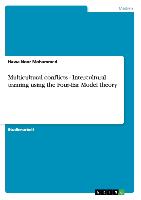- Start
- Multicultural conflicts - Intercultural training using the Four-Ear Model theory
Multicultural conflicts - Intercultural training using the Four-Ear Model theory
Angebote / Angebote:
Studienarbeit aus dem Jahr 2009 im Fachbereich Medien / Kommunikation - Interkulturelle Kommunikation, Otto-von-Guericke-Universität Magdeburg (Institute of Political sciences), Sprache: Deutsch, Abstract: [...]
In this paper, an analytical method will be employed to find out why intolerance
sometimes exists in multicultural settings and if intercultural dialogue and training can
be used to reduce such tensions. The question that will try to be answered is: Can
intercultural training using the Four-Ear Model help boost tolerance in multicultural
settings? The motivation for writing this paper is based on the prevalent cases of
'unnecessary hatred' that is sometimes expressed though violence in many parts of the
world today. Globalization calls for more understanding between people who abide by
different cultures and religions. Lack of understanding of other cultures apart from
one's own does not make the situation any better hence leading to vices such as
racism and bad ethnicity, which translates, into conflicts and sometimes-even war. It is
upon the realization that humanbeings could be assisted to co-exist peacefully through
intercultural training that this paper is written. A famous theory by a German
psychologist, Friedemann Schulz von Thun, will be used in order to better understand
the causes of such conflicts and how such problems could be solved. A closer look will be the relations between international students and natives (i.e African students in a
German multicultural setting) and how the Four-Ear Model could be utilized to promote
tolerance for that case. This is due to the fact that hundreds of students from East
Africa travel to Germany every year to acquire further education and many a times,
they are faced with problems related to conflict of cultures. Apart from the obvious
similarities amongst all human beings-most aspects such as, interaction,
entertainment, travel, dressing, eating etc that ar
Folgt in ca. 5 Arbeitstagen
